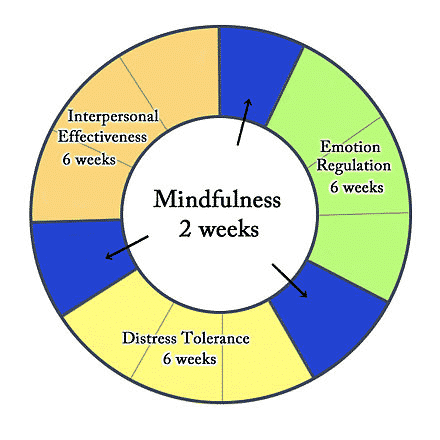DBT, medically known as dialectical behavioral therapy is a type of talking therapy treatment that can be performed by either:
- One to one talks with individual therapists
- A group therapy session
- Phone coaching therapy with a dbt therapist
DBT is based on cognitive behaviour therapy (CBT) but has been specially adapted to treat individuals who suffer from extremely intense emotions. DBT is used to help struggling individuals identify and positively change negative thinking patterns. Dialectical behavioural therapy has roughly six main points that need to work in conjunction with each other. Patients are instructed to not think too far into the future, which can be a trigger for an individual and lead them to experience the following episodes:
- Depressive state
- Destructive behaviours
- Encourage eating disorders
- Suicidal behaviors
Individuals will be taught positive, healthy ways to deal with stress and general emotions that will occur from daily situations, and improve their overall relationships with loved ones and regulate their emotions. The end result of dialectical behavioral therapy is to identify, change and help an individual cope with negative and unhealthy behaviour patterns and emotions, mainly during social situations. Dialectical behavior therapy (dbt) is usually referred to individuals who suffer from destructive behaviors, mental health complications and chronic suicidal attempts.
The theory behind dialectical behaviour therapy
DBT treatment is based upon six main points extracted from CBT therapy. The medical treatment was developed in the late 1980s by psychologist Marsh M. Lineham, the theory behind the treatment was initially used to treat an individual with a borderline personality disorder and chronically suicidal individuals. However, the treatment has been slightly adapted to treat a variety of other mental health disorders successfully.

The skills modules in dialectical behavior therapy include:
- DBT is still an evolving medical treatment that will hopefully be used to treat other mental health issues. The therapy evolved into a process in which the client and the medical professional will work one to one to help the patient learn skills such as:
- Acceptance of situations
- Change oriented strategies
- Emotions regulation
- Distress tolerance
- Interpersonal effectiveness
Patients will be medically reviewed every three weeks by the consultation team to ensure the dbt skills are sufficient for the specific individual.
Dialectical behaviour therapy strategies
Contrary to popular belief, there are only four main modules that are introduced into dialectical behaviour therapy treatment, rather than the six, which is what the majority of people believe. The first is:
Mindfulness
Mindfulness is a critical skill that will be taught when patients are in their skill groups. This emotion leads an individual to practice being present and fully aware within the moment, feel life for what it is and not live years in the future. This specific skill is considered as the foundation, a patient will not be taught any other skill sets within DBT classes until they have a full grasp of being a mindful person.
Becoming a mindful person will help a patient accept and tolerate any form of powerful or overwhelming emotion they may have to deal with during day-to-day life. Mindfulness relies heavily on the principle of acceptance.
An individual will learn to accept all situations, no matter how intense or overwhelming their feelings may become. With time, the patient will learn how to master the techniques taught in their skill groups. This technique allowed you to mentally slow down in life and focused on you and the positives around you, no matter how stressful and negative a situation could become.
Interpersonal effectiveness
Learning interpersonal effectiveness is a skill that closely follows once you have effectively grasped the skill of mindfulness. Learning how to interact with the people around you, personal relationships and the challenges that can create a stressful environment.
When learning interpersonal effectiveness skills, you will understand how to communicate clearly and without animosity when you disagree or say no to a situation or request. An individual will also learn how to ask for what they want whilst maintaining self-respect and a functional relationship with others.
Distress tolerance
Within the session of distress tolerance, an individual will learn the art of acceptance and change. You will discover four primary technique within this class that will help you handle any crisis; this will include:
- Self-soothing
- Improving the stressful situation
- Thinking of the pros and cons of the situation
- Distracting yourself
A critical element of learning acceptance is first to grasp the idea of radical acceptance.
Radical acceptance allows you to embrace the idea that you will face both negative and positive situations within your life. Still, you will learn how to view these situations without being judgmental—learning how to accept the outcome no matter the problem. This skillset heavily incorporates the first skill mentioned, which was mindfulness.
Emotion regulation
The last skill set that will be taught is emotion regulation. This technique is essential to master, learning to control your emotions when you are an intense person can be a struggle, but with the right help, you can achieve anything. Emotion regulation session is perfect for individuals who are regularly overcome with the following emotions:
- Anger
- Depression
- Anxiety
- Frustration
An individual who regularly goes through intense negative emotions will benefit from learning how to regulate and control their emotions. Once a patient has learnt how to manage their feelings, they decrease their vulnerability to any form of painful emotions caused by situations that are entirely out of their control.
Please do get in contact if you believe you or a loved one may benefit from dialectical behaviour therapy. It is essential to talk with a medical professional who can put you on the right path to enjoying your life again. The first step is always the hardest, but here at Shoreline Recovery Center we can get you the help you need. Our team of medical professionals are here to assist you.